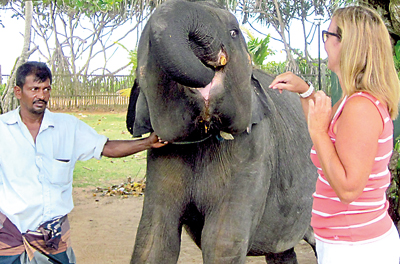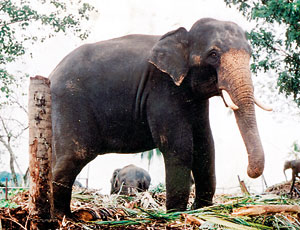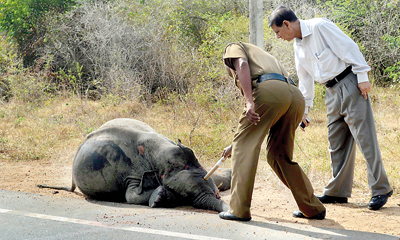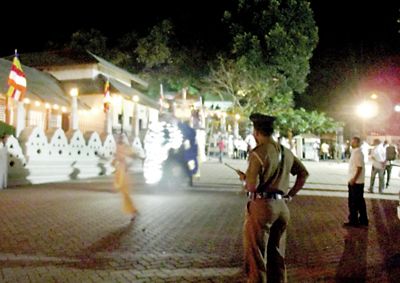Lost in captivity
The baby elephant at the resort hotel in Bentota on July 13 was present to welcome guests. An animal lover visiting the hotel was aghast. For here was an animal that should still be in the wild or in a safe haven, instead entertaining tourists. But thankfully Sanju (as the animal’s current owner calls him) is no longer at work.

No longer there: Baby Sanju at the hotel
Bentota Beach Hotel General Manager Sanjeewa Perera said Sanju is about six years old and this was confirmed by Sanju’s current owner. The hotel had an elephant as a tourist attraction for about 30 years, usually leased, he said.
Technically, it is not illegal for hotels to keep elephants or for elephants to be used in safaris as long as the animal is not younger than five years. However, are elephants being used in ways that are in violation of permit conditions, especially baby elephants, was the question raised by animal activists.
All captive elephants in Sri Lanka must be registered under the owner’s name with the Department of Wildlife Conservation with an annually renewable permit, the DWC’s Head of Law Enforcement Chandani Wilson told the Sunday Times.
This process, under Section 22A of the amended Fauna and Flora Protection Act of 2009, establishes the chain of custody for the animal with photographs and descriptions of its special features to prevent permit forgeries and new, illegally caught animals being substituted for dead ones.
“If you want to get an elephant in Sri Lanka, you must go through Pinnawala or through the elephant transit home in Uda Walawe,” environmental lawyer Jagath Gunawardena said. “There are two ways to obtain a baby elephant under this procedure. First, by donation and second, if a captive she-elephant gets pregnant. That hasn’t happened for about 50 years in Sri Lanka (under private ownership). Therefore, if the calf was not by donation, we assume it has been taken from the wild illegally.”
Sanju’s current owner, businessman Jagath Withana from Matugama told the Sunday Times that he had purchased the baby elephant from one Maharagama Roshan, who in fact, had been investigated by the Wildlife Department in 2008. Mr. Withana bought the elephant later.
In general, there are no provisions in the law to permit catching elephants in the wild and all the provisions in the past that allowed it are no longer pertinent, Mr. Gunawardena said. Since 1993, government does not donate elephants to private parties, but private owners can apply for permits, Ms. Wilson said. Despite the law, illegally catching elephants and exploiting animals with permits for financial gain is a “widespread practice,” mammal researcher and Chairman of Species Conservation Centre Pubudu Weeraratne told the Sunday Times.
“We know there is a trade of smuggling baby elephants,” he said. “Pinnawala and other places donate elephants for temples only for religious and cultural purposes such as peraheras but the animals end up in safaris or hotels or logging camps, which is a violation of permit conditions. This is a highly politicized issue, the people involved tend to be well-connected and some religious persons are also behind this.”
Mr. Withana owns several elephants along with Sanju, and said he spends about Rs.100, 000 a month maintaining each elephant.
“It’s not an easy task maintaining an elephant, you have to spend a lot of money for kithul, antibiotics, land, etc,” he said. “I keep elephants because of my pride, not because I can actually earn from them.” He leases out elephants to hotels and peraharas.
“I don’t use elephants for revenue, but I do know people can take elephants from temples and keep them for logging or peraheras,” he added. “Monks get permits from political officials claiming the elephant is for the temple and then give it out to someone for Rs. 50, 000 or Rs. 100,000 and earn from the elephant.”
The Wildlife Department only investigates whether owners have permits and not the misuse of permits, Ms. Wilson said.
“It’s not under the purview of our department to investigate animals being rented out,” she said. “How can we investigate? We only investigate whether the elephants have permits.”
She added that animal abuse -cases where elephants are physically harmed by handlers, malnourished or harmfully restrained are investigated by the police, under the Cruelty to Animals Ordinance.
“The Cruelty to Animals Ordinance is not enforced as often as it should and permit violations are not properly prosecuted,” Mr. Gunawardena said. “The Police and Wildlife Department don’t enforce these laws because of severe political pressure. The Wildlife Department can do the job properly as long as they are protected from political and bureaucratic interferences and the police give them a hand.”
Baby elephants are extremely dependent on their mothers and the herd to survive, and they are usually weaned only after about 10 years. Young elephants separated from their mothers suffer from stress and depression, and are known to retaliate against human captors, mammal researcher Shantha Jayaweera said.
“The best thing we can do for baby elephants without mothers is to reintroduce them to the wild through the Uda Walawe Elephant Transit Home, where they can make small herds with other elephants,” Mr. Jayaweera said.
Sanju is no longer at Bentota Beach Hotel. Assistant Vice President for John Keells Group Chitral Jayatilaka told the Sunday Times that as of July 15, John Keells has taken a “firm decision not to house any animals in captivity within any of our resorts.”
comments powered by Disqus






















